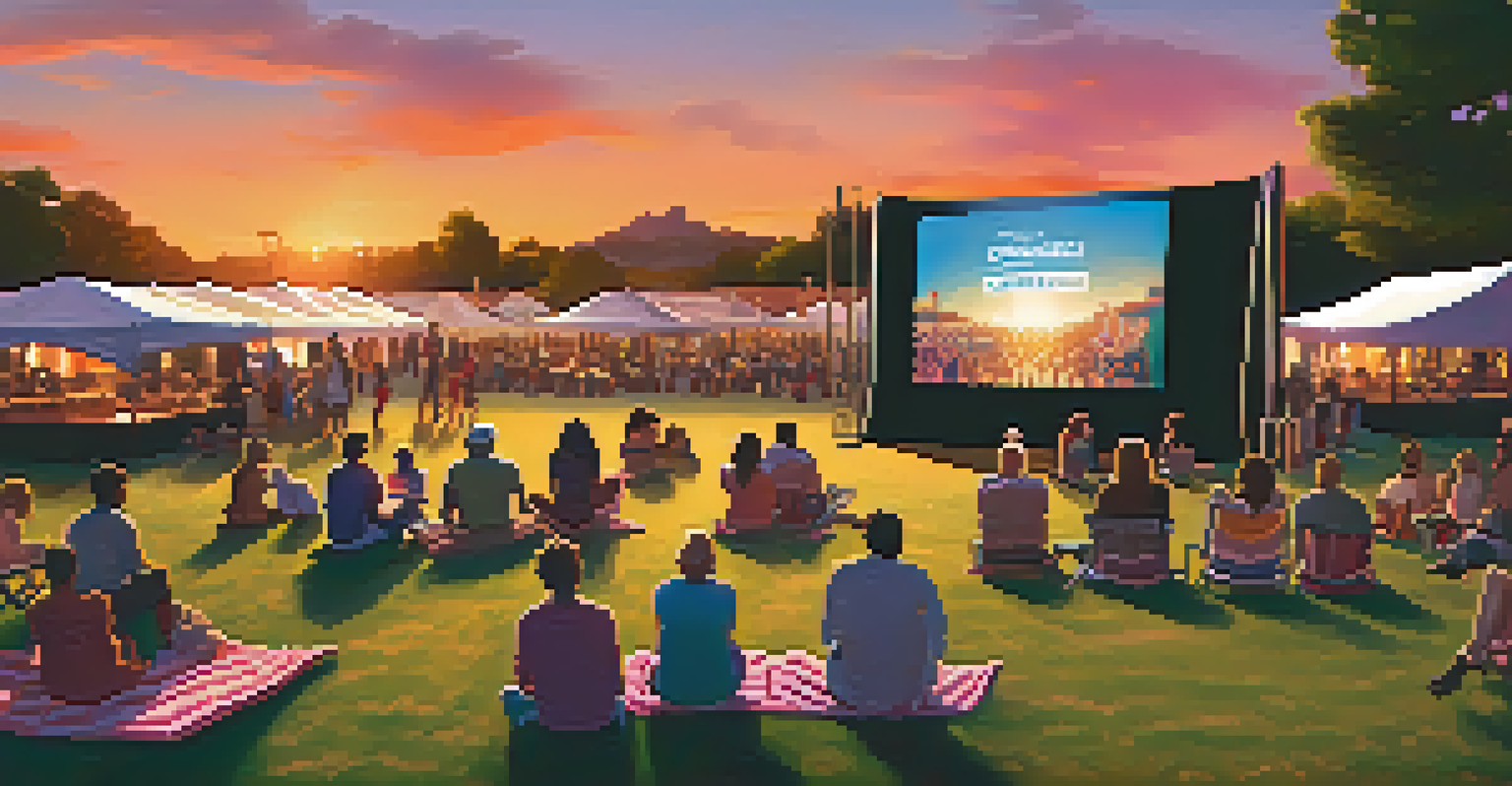Cultural Reflection: How Global Events Influence Hollywood

The Interconnection Between Culture and Film
Film has always been a mirror reflecting societal values and issues. When we look at Hollywood, it’s clear that global events shape not just the stories told but also the very fabric of the industry. From war to peace movements, these events influence everything from casting to plot development.
Cinema is a matter of what's in the frame and what's out.
For instance, during the civil rights movement of the 1960s, we saw a surge in films that addressed race relations and social justice. This shift was not just a response to the times but also an attempt to engage audiences in conversations about equality and human rights. It highlights how filmmakers often draw inspiration from the world around them.
As global events unfold, they create a backdrop that can either inspire creativity or prompt filmmakers to reflect on societal challenges. Hollywood, in turn, plays a crucial role in shaping public perception and sparking dialogue about these issues, making it a powerful cultural force.
Major Historical Events and Their Impact
Historical events like World War II and 9/11 have left lasting imprints on Hollywood. After the attacks on September 11, 2001, there was a notable shift in film narratives, with a focus on themes of heroism, sacrifice, and national identity. Movies like 'United 93' and 'World Trade Center' emerged as poignant tributes to the resilience of the human spirit.

These films not only reflected the collective trauma experienced by the nation but also provided a means for audiences to process their feelings. The entertainment industry often serves as a therapeutic outlet, allowing viewers to confront their fears and uncertainties through storytelling.
Culture Shapes Hollywood Narratives
Global events and social movements significantly influence the themes and storytelling approaches in Hollywood films.
Moreover, the portrayal of global conflicts in films often shapes public opinion and understanding of these events. By dramatizing real-life situations, filmmakers can create a sense of empathy and awareness that transcends borders, influencing how audiences perceive international relations.
Social Movements and Hollywood's Narrative Shifts
In recent years, social movements like #MeToo and Black Lives Matter have profoundly influenced Hollywood. These movements have prompted filmmakers to address systemic issues within the industry, leading to more diverse storytelling and representation. The call for inclusivity has shifted the narrative landscape, making it richer and more varied.
The power of storytelling is that it can capture the complexities of human experience and reflect the world around us.
For example, films like 'Moonlight' and 'Black Panther' have not only topped the box office but have also garnered critical acclaim for their authentic portrayals of marginalized communities. These stories resonate with audiences, reflecting a broader cultural shift toward understanding and acceptance.
As filmmakers respond to these movements, they challenge traditional norms and push for a more equitable industry. This evolution highlights how Hollywood is not just a place of entertainment but also a platform for social change, where stories can inspire action and reshape cultural narratives.
Globalization: A New Era for Storytelling
With the rise of globalization, Hollywood now faces the challenge of appealing to a diverse global audience. This shift has led to an increased interest in international stories, cultures, and perspectives, enriching the cinematic experience. Films like 'Parasite' and 'Roma' have demonstrated that audiences are eager for narratives beyond the typical American-centric viewpoint.
This globalization of film has encouraged cross-cultural collaborations, resulting in unique storytelling that resonates on multiple levels. By incorporating various cultural elements, Hollywood can create films that not only entertain but also educate and bridge cultural gaps.
Technology Transforms Storytelling
Advancements in technology and the rise of streaming platforms have revolutionized how stories are told and consumed in the film industry.
As international films begin to break into mainstream markets, Hollywood filmmakers must adapt their storytelling techniques to meet the expectations of a broader audience. This evolution opens the door for new narratives and voices, ultimately enriching the cinematic landscape.
The Influence of Technology on Storytelling
Technological advancements have drastically changed how stories are told in Hollywood. From CGI to virtual reality, filmmakers have more tools at their disposal than ever before. This evolution has allowed for more innovative storytelling techniques that can captivate audiences in unprecedented ways.
For example, the rise of streaming platforms has transformed traditional viewing habits, enabling filmmakers to experiment with formats and genres. Series like 'Stranger Things' and 'The Queen's Gambit' have proven that audiences are ready to embrace longer narratives that delve deeper into character development and complex themes.
Additionally, technology has made it easier for filmmakers around the world to share their stories. Independent films can now reach global audiences with just a click, highlighting the importance of diverse voices and perspectives in the industry.
The Role of Politics in Hollywood Narratives
Politics has always been a significant influence on Hollywood narratives, shaping the way stories are told and received. Political climates often determine the themes that resonate with audiences, leading to films that either reflect or challenge the status quo. For instance, during election cycles, we often see a surge in politically charged films that provoke thought and inspire debate.
Movies like 'The Trial of the Chicago 7' and 'Vice' tackle controversial topics, prompting viewers to engage with political issues in a meaningful way. These films serve as reminders of the power of cinema to influence public opinion and encourage critical thinking.
Politics Drive Film Themes
Political climates often dictate the narratives in Hollywood, encouraging filmmakers to reflect or challenge societal issues through their stories.
In this way, Hollywood not only entertains but also educates audiences about political realities, often using satire and drama to highlight the absurdities of politics. This dynamic interplay between film and politics continues to evolve, making it a fascinating aspect of cultural reflection.
The Future of Hollywood and Cultural Reflection
Looking ahead, the relationship between global events and Hollywood storytelling will only deepen. As the world becomes more interconnected, filmmakers will continue to grapple with how to represent diverse cultures and perspectives authentically. This evolution presents a unique opportunity for growth and innovation within the industry.
The increasing demand for representation and inclusivity will likely push filmmakers to explore untold stories that reflect the complexities of contemporary society. As audiences become more discerning, Hollywood will need to rise to the occasion, ensuring that the narratives presented resonate with a global audience while remaining true to their roots.

Ultimately, the future of Hollywood will rely on its ability to adapt and respond to the ever-changing cultural landscape. By embracing the power of storytelling, filmmakers can continue to reflect the world around them, inspiring audiences and fostering understanding across cultures.